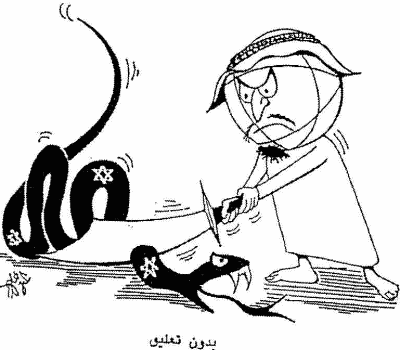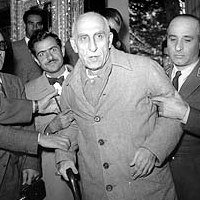![]()
Sun, Aug 08, 2010 | The Rubin Reports | By Barry Rubin
Can you handle the Truth? Poll Shows the Shocking Reality of Arab Public Opinion
This is one of those stories about the Middle East that is totally amazing but not the least bit surprising. What, you ask, do I mean? From the standpoint of the way the region is portrayed in the West this information is incredible but if you understand the area it is exactly what you’d expect.
I’m referring here to the recent 2010 Arab Public Opinion Poll conducted by Zogby International and the University of Maryland for the Brookings Institution. Note that this poll was only done in relatively moderate countries: Egypt, Jordan, Lebanon, Morocco, Saudi Arabia, and the United Arab Emirates,
Here are some of the main findings:
–Arab views “hopeful” about the Obama Administration policy in the Middle East declined from 51 to 16 percent between 2009 and 2010, while those “discouraged” rose from 15 to 63 percent. Why? Because while the Obama Administration tried to flatter Arabs and Muslims, go all-out to support the Palestinians, distanced themselves from Israel, and took other steps it was not deemed sufficient.
Nothing the United States did would persuade the audience because of such factors as: different ideologies and ambitions, clashes of interest, the filter of government and Islamist propaganda, and excessively high demands. While the populations are “discouraged” with the administration largely due to their radicalism, the regimes are unhappy with it because they feel the U.S. government isn’t strong enough in opposing such enemies as revolutionary Islamism and Iran.
Still, unless U.S. policy comes to resemble that of Egypt, Saudi Arabia, or Jordan, many or most Arabs will continue to be bitter and angry. Obama’s levels of support among Arabs are not that different from those of his predecessor.
–What about perceptions of threat? Same story. Those thinking Israel is a huge threat is at 88 percent (down slightly from 95 percent in 2008) showing that overall hostility just doesn’t go away. Do you think that any conceivable Israeli policy would change this fact?
Note that while it is would not be surprising if Arabs see Israel as an enemy generally or as being mean to the Palestinians, for Jordanians, Saudis, and Egyptians to describe Israel as the greatest threat to their own countries shows something beyond rational calculation is involved. The prevalent idea is that Israel wants to take over the Middle East or wipe out Islam or destroy the Arabs. This makes a lasting compromise, comprehensive, and friendly peace rather unlikely.
–What about the United States? Here, too, Obama’s efforts have failed. The idea that the United States is the other main threat to Arab countries and societies declined from 88 percent under George W. Bush at the end of his term to “only” 77 percent under Obama in 2010. Given the dramatic change in personality and policy this amounts to nothing.
–As for Iran being a threat, this view among the Arabs polled grew from 7 percent in 2008 to a “whopping” 13 in 2009 and then down to 10 percent in 2010. In other words, the Arab masses believe the United States is about eight times more of a threat than Iran. Indeed, if you add in the score for the United Kingdom, 96 percent see Washington or London as the greatest threat to themselves. Again, the ruling elites have a different view but no wonder they are so cautious about opposing Iran or lining up with the United States.
–Asked which foreign leader they most admire, almost 70 percent name an Islamist or a supporter of that movement’s forces: Turkish Prime Minister Recep Erdogan (20), Venezuelan President Hugo Chavez (13), Iranian President Mahmoud Ahmadinejad (12), Hizballah’s Hassan Nasrallah (9), Syrian President Bashar al-Assad (7), Usama bin Ladin (6), and the late Iraqi President Saddam Hussein (2).
No relatively moderate Arab leader has any significant international following. And note that two non-Arab Middle Easterners (Erdogan and Ahmadinejad) score so high, showing a decline in Arab nationalism that would have been unthinkable during the 1950-2000 era.
Unfortunately, these and other findings reflect the realities of the Arabic-speaking world: the hegemony of radicalism among the masses, passionate hatred for Israel and the West, and lack of sympathy for democracy or liberalism. And the overall trend is to make things even worse, since there is so much positive feeling toward revolutionary Islamism rather than even militant Arab nationalism.
Presumably, of course, Saudis, Jordanians, Egyptians, and others would have expressed support for their own regimes, so this poll should not necessarily be read as implying support for revolution at home. Yet it certainly–like other such polls–indicates backing for terrorism, extremism, and anti-Westernism in regional terms.
The idea that appeasement, concessions, and flattery will make a big shift has been proven wrong in fact and practice, though no doubt the mythology that Obama has transformed America’s position in the region will persist among the very elites and “experts” who should know better. Indeed, this is precisely the way the poll was spun on its being released. The clear effort is to portray the problem as one of U.S. policy even under Obama being too friendly toward Israel, as if no other issue in the region existed.
If Arabs are so passionate in their belief that the United States and UK are a threat to their countries, support in large numbers the Islamist transformation of large parts of the region, think Israel is so profoundly dangerous, and are friendly toward an adventurous, expansionist Iranian regime, can someone possibly be so naive to think that bashing Israel or creating a non-Islamist Palestinian state is going to defuse that deeply and passionately held world view?
Yet this is precisely how the poll was spun by the Brookings Institution: as showing the United States wasn’t doing enough to distance itself from Israel. Forget about Islamism versus nationalism, poverty, inequality for women, corruption, repression, the war in Iraq, Iran’s nuclear weapons’ drive, nearly universal dictatorship, Kurds and Berbers, the growing gap between the Arabic-speaking world and the West or even the faster-progressing states of Latin America and Asia, terroristic violence, and every other issue in the region. We are constantly told that the only thing of any importance is the Palestinian issue.
What are the Arabic-speaking world’s real problems?
–A failure of Arab statist dictatorships and Arab nationalist ideology which promised so much and delivered so little. The results include repression, corruption, and far lower living standards (except in low-population, high oil-production Gulf states) than might exist otherwise.
–A stifling traditional culture that clashes with modernity without finding some hybrid solution. This gives rise to the attractive slogan that “Islam is the solution” which promotes an effort to turn the clock back parallel to what happened in past Western societies (the Counter-Reformation, the post-1815 anti-democratic reaction, fascism) and Japan (the revival of feudal military ideology that led to Pearl Harbor).
–The regimes’ effort to use violence, scapegoating of the West and Israel, elements of Islamist ideology, and intransigence to win mass support. (Though when one sees the poll figures this is understandable.)
–Internal group conflicts among Sunni, Shia, and Kurds, among other group and regional quarrels.
–The failure to achieve fully integrated states which are sabotaged by pan-Arab and pan-Islamic doctrines.
This is only a partial list. Yet one thing is clear: whether by force or appeasement, seeking popularity or advertising for their own way of life, Western countries cannot solve these problems. The only solution is internal and it will take decades at best. What the West can do is to defend itself, help the most relatively moderate forces (both governments and mass opposition movements as in Lebanon and Iran), and stand up for its own values.
The worst thing it can do is to practice appeasement, a policy that seems to prove the radicals right about Western cowardice and admitted sinfulness, thus inspiring them to more aggression and a stronger popular base of support. Apology and retreat appears to confirm the dysfunctional revolutionary ideologies and favor the revolutionary forces. In the face of the radical advance and Western retreat, demoralized moderates rush to get good surrender terms or join the mob.
Transformation to something better can only come when Arabs and Iranians conclude that the revolutionary road doesn’t work and is wrong. Teaching them that it does work and that they are right to pursue it will lengthen the period of change and cost hundreds of thousands of lives.
As long as there is a huge gap between the actual Middle East and the fantasy Middle East so dear to many Western academics, journalists, and diplomats, the region will remain incomprehensible and Western policies will not engage with reality.
You can download the Poll results as pdf here.
About the author,
Barry Rubin is director of the Global Research in International Affairs (GLORIA) Center and editor of the Middle East Review of International Affairs (MERIA) Journal. His latest books are The Israel-Arab Reader (seventh edition), The Long War for Freedom: The Arab Struggle for Democracy in the Middle East (Wiley), and The Truth About Syria (Palgrave-Macmillan). For the website of the GLORIA Center go here and for his blog, Rubin Reports, go here.



 RSS
RSS











Poll Shows the Shocking Reality of Arab Public Opinion #Israel #US #Arab #Iran #obama http://j.mp/cOc7xU
RT @CrethiPlethi: Poll Shows the Shocking Reality of Arab Public Opinion #Israel #US #Arab #Iran #obama http://j.mp/cOc7xU
[…] Shows the Shocking Reality of Arab Public Opinion by Barry Rubin (source: Crethi Plethi) Wednesday, September 22, […]